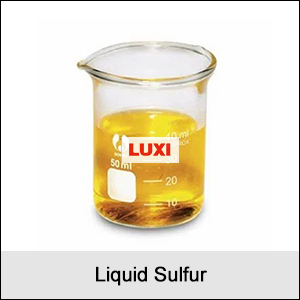Liquid Sulfur
1. Overview:
Liquid sulfur is a highly viscous, molten form of sulfur that is typically used in various industrial applications.
2. Properties:
- Chemical Formula: S
- Physical State: Yellowish-orange liquid at temperatures above 115.2°C (239.4°F). Below this temperature, it solidifies into a yellow, crystalline form.
- Density: Approximately 1.8 g/cm³ at 120°C
- Melting Point: 115.2°C (239.4°F)
- Boiling Point: 444.6°C (832.3°F)
3. Reactivity:
Liquid sulfur is relatively stable at high temperatures but can react with oxygen, forming sulfur dioxide (SO₂) or sulfur trioxide (SO₃). It is non-conductive and does not support combustion.
4. Applications:
- Used in the production of sulfuric acid, a key component in fertilizers, chemicals, and industrial processes.
- Employed in vulcanization and the production of synthetic rubbers.
- Used as a degreaser and in the removal of sulfur compounds from crude oil in the oil and gas industry.
- Applied as a fungicide and insecticide in agriculture to protect crops from pests and diseases.
5. Storage and Safety:
Liquid sulfur is typically stored in insulated, pressure-resistant containers to prevent freezing and maintain its molten state. Proper temperature control is essential to avoid accidents.



